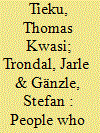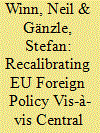|
|
|
Sort Order |
|
|
|
Items / Page
|
|
|
|
|
|
|
| Srl | Item |
| 1 |
ID:
176492


|
|
|
|
|
| Summary/Abstract |
This study contributes to the field of International Public Administration (IPA) and the emerging area of Informal International Relations (IIR) by examining the politics of staffing and recruitment of the African Union Commission (AUC). Although the AUC has become a major political player in international affairs, there is a dearth of knowledge about the civil servants who work for the AUC and who run this paramount pan-African executive body. To address the void, this paper draws on a survey of 137 AUC staff, archival studies and interviews to explore recruitment of AUC staff. Combining organisational theory and informality as analytical lenses, the study demonstrates that, first, many informal international practices (IIPs) are embedded in AUC recruitment processes. Second, the AUC is composed largely of short-term, contracted staff. Finally, it shows that the AUC is dependent on lower-ranked personnel or that it is bottom-heavy. Many of these lower-ranked officials are intimately involved in the making of AUC policies and decisions, putting into question the assumption in existing scholarship that decision-makers of IOs are primarily reliant on top-ranked A-level officials (senior management).
|
|
|
|
|
|
|
|
|
|
|
|
|
|
|
|
| 2 |
ID:
191450


|
|
|
|
|
| Summary/Abstract |
With China and Russia acting more assertively vis-à-vis Central Asia, Kazakhstan, Kyrgyzstan, Tajikistan, Turkmenistan, and Uzbekistan have gradually moved to the core of contemporary Eurasian geopolitics – albeit to varying degrees. The European Union (EU) has purposefully sought to promote its norms and values in the region for quite some time in the past. However, considering the ongoing Western “polycrisis” exacerbated by the Covid-19 pandemic most recently, our paper investigates how the EU has been recalibrating its relationship towards Central Asia – within the timespan of its two EU Central Asia Strategies, dating from 2007 and 2019, respectively. We argue that the reformulation of EU policy towards Central Asia is pragmatically taking its lead from the growing constraints of EU foreign policy as well as Chinese and Russian intervention in the region; it is, in the end, geographical proximity that continues to shape geopolitics in Central Asia.
|
|
|
|
|
|
|
|
|
|
|
|
|
|
|
|
|
|
|
|
|